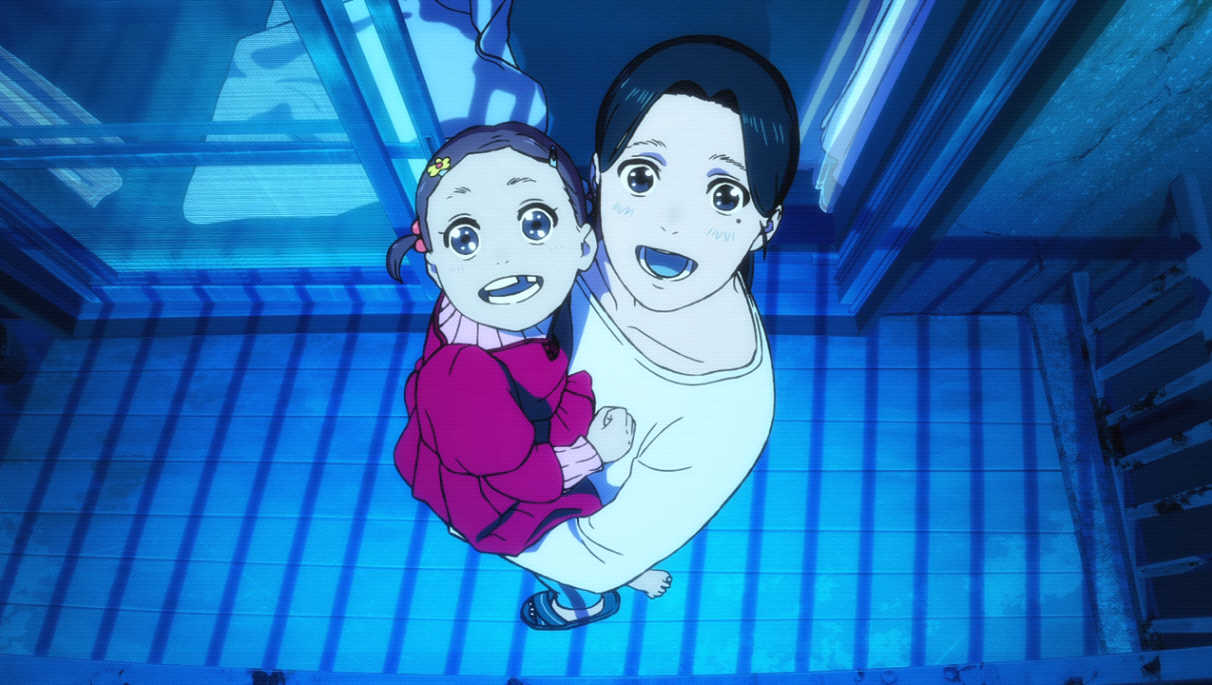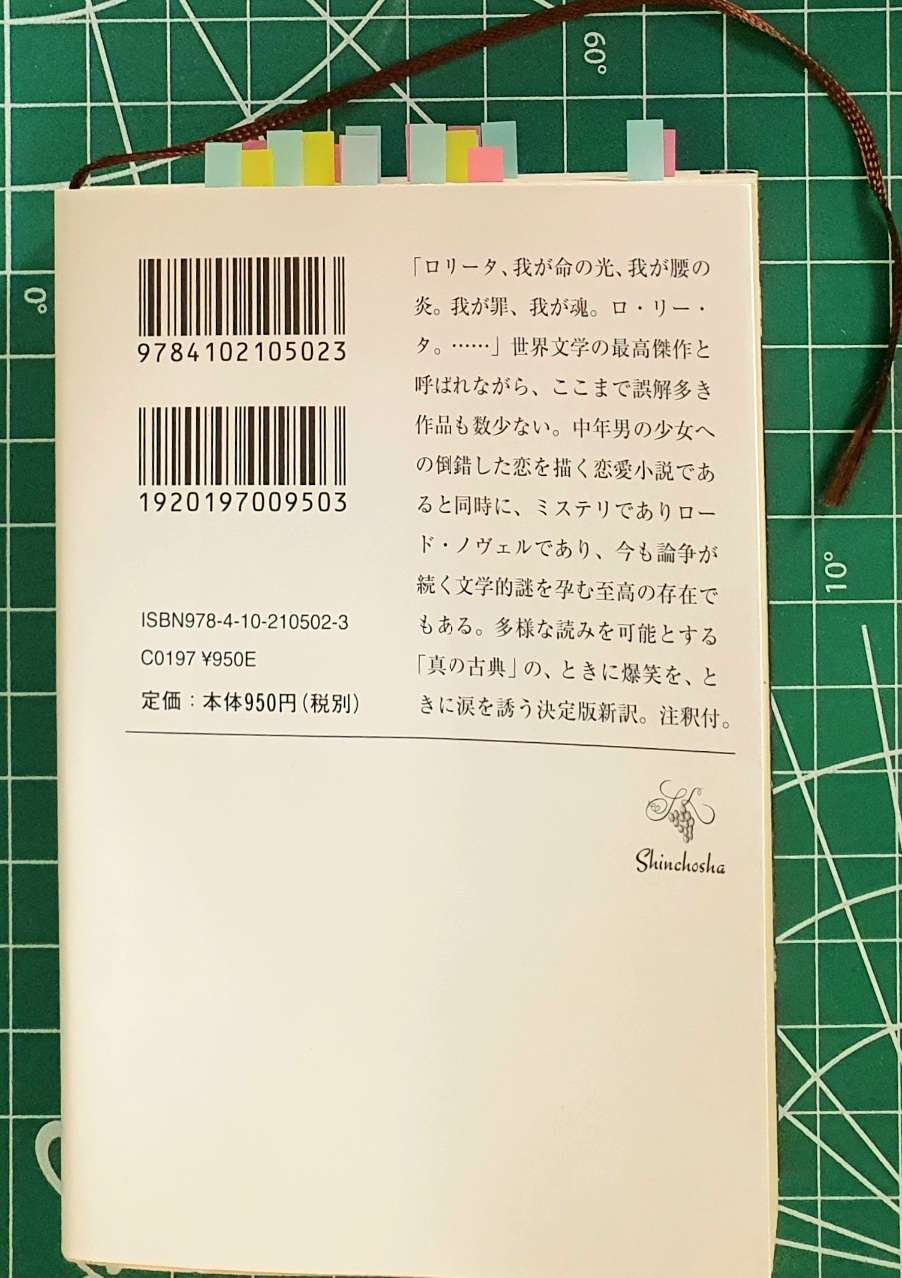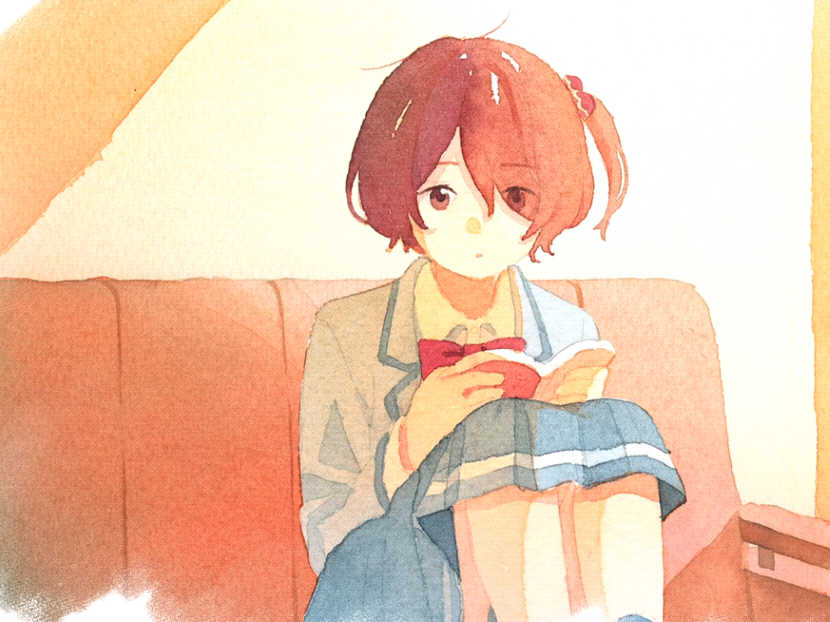Japanese Reading Report: 17 November 2024

This week was the final full week before flying to the United States. I wanted to finish Lolita before flying away, and I'm glad to say that I was able to! I also watched a new anime, 負けヒロインが多すぎる!, from start to finish. It ended up being quite a busy week, so, unfortunately, my notes on Lolita and other things will be somewhat lacking. Next time I post a report it will be from chilly New England. À bientôt!
- ロリータ (438-564ページ)
- 負けヒロインが多すぎる! (第1-12話)
- ダンダダン (第7話)
- 魔法少女リリカルなのは (第2-9話)
- サーシャちゃんとクラスメイトオタクくん (1巻)
ロリータ

Starting straight from chapter 23, Humbert has lost Lolita and
tries his best to track her and her kidnapper/accomplice down.
He still suspects (maybe knows?) that it's Trapp, and remarks on
Trapp's unique way of writing certain letters (w, t, and l).
He also says that Trapp has many of the same skills and interests
as himself: French, mysteries, literature, etc. so he believes
he can untangle the pseudonyms Trapp is using in motels to chart
their travel. To be honest it was another chapter that felt a
bit tricky to understand, so I may be way off the mark there.
Humbert also mentions that it had been two years since he lost
Lolita (again, this may have been a misread and two years feels
like a lot...) which, if that's the case, would mean she would
have been 16-17 if he found her around the time of this chapter.
Two interesting notes on chapter 25. When Humbert talks about
his dreams and waking visions of Lolita he says that her form
is never stable — that she shifts between Valeria, Charlotte,
and several other girls and women he's known (sexually?). The
chapter then goes on to include a lengthy poem he composed directed
towards Lolita. It's quite dense, and I'm certain I'd miss a lot
of its nuances reading it in English as well, but I really enjoyed
it. He mostly refers to Lolita as Lolita within the poem, but one
time the translator uses ロリヰタ, replacing the vowel elongator
with an archaic character ヰ, which sort of evokes an ancient,
mythological presence and lifts her up and outside of the mortal
world. There is one mention of Dolores Haze in the poem but, more
interestingly to me, he also refers to Lolita Haze. That stood
out to me because I'm certain it's the only time he's called her
that, and it felt like the first time that he didn't properly
separate out their essence in his mind.
Synthesising some thoughts about Chapters 23 and 25 (24 was just
one of those really short stop-gap chapters, but I guess you can
include it too), something that has been stewing in my mind since
at least part 1, chapter 28, p. 227, the conversation with the
smoking "ally" at the hotel. Humbert is aware that what he's doing
is unacceptable, but that's never more evident to me than when he
worries that someone else will do exactly what he does. He wants
to see his behaviour as the only acceptable version — one that
somehow prevents harm, or at least comes with good intentions — and
he sees the exact same action by others as a threat. You could zoom
out and apply this to any (monogamous) relationship dynamic, but I
think it feels particularly relevant for people attracted to minors.
Perhaps in the same way that virginity is so highly valued in Western
culture, there's a desire for people like Humbert to be the sole
partner of their victims.
Another (somewhat related) thought I've had reading these chapters
is that I feel like I underestimated how serious Humbert's love for
Lolita is. At this point (assuming my timeline of events is correct)
Lolita is rapidly aging out of her status as a nymphet, yet Humbert
still pursues her. I imagine at this point he could just cut her loose
from his mind and he'd be totally safe from legal trouble, but he's
risking his own safety and freedom to "save" her. Perhaps it's true
love...
Chapter 26 (well, the end 26,) introduces Rita, a woman who enters
Humbert's life by chance amidst his journey to find Lolita. At first
I thought that she was proof that Humbert could move on (and I'm sure
that's somewhat intentional) but it becomes quickly apparent that he
sees her as consumable as his past relationships. First he lists her
positive qualities (mostly how nice she looks and how kind she is
towards him), then he gives a bit of her history (thrice married),
and finishes off her introduction by explaining that she's one of
the stupidest women he's ever met. He says that compared to Rita,
Valechka (that's right, intentionally unearthing her hate name) and
Charlotte are like philosophers. Not only does that push Rita down,
it also brings up additional contempt for Valeria and Charlotte.
By that point I still expected Humbert to move on and start a life
with Rita, but it's clear that he's still obsessed with tracking down
Lolita. They may or may not have killed a man...
Eventually Humbert receives a letter from Dolores updating him on her
situation (she is married and pregnant) and asking for money (between
$300-$400, but anything would do,) to help her and her new husband move
to Alaska for work.
She signs the letter Dolly (Mrs. Richard K. Schiller)
Humbert writes a
short note to Rita saying that he's leaving, sticks it to her stomach
while she sleeps (she simply wouldn't notice it otherwise, you see),
and then packs some things and heads out.
I should mention that there has been some attention given to a gun
Humbert possesses for the last 10 chapters or so. Since its revelation
(around the time of Mr Trapp) it has existed as a weight in Humbert's
pocket, and a reminder of the violence he's capable of.
So anyway... Humbert has a gun, a plan (sort of), and a rough destination.
He then uses the next chapter or so travelling across country while
pinpointing where exactly Lolita settled down.
Chapter 29 is a big one. Humbert rocks up to the Schiller residence
and sees Lolita for the first time in a long time. She's 17 now
(Humbert's framing makes me feel like she's getting so old, but she's
still a child...), her tan has faded, and she's heavily pregnant. She
invites Humbert inside and offers him refreshments, and later when Richard
(Dick) returns, she introduces Humbert as her father.
It's interesting that Dick calls Dolores "Dolly" and that she reciprocates
that title in her letter to Humbert a chapter earlier. "Lolita" is a
title that Humbert assigns to her and eventually starts using openly for
her, but we never see an instance of her referring to herself with that
name. That instance made me feel that her relationship with Dick is at
the very least more mutually desired by her, despite other hardships.
Humbert gets trapped in his own mind for a while in this chapter, wondering
how many times the two of them had sex, putting Dick and Dolores down,
and generally just coping through the fact that he lost. The gun weighs
heavily in his pocket.
Dick gives Humbert and Dolly some more time alone to talk. Dolores
explains a few of the gaps in Humbert's knowledge, though I think the man
who "emancipated" her is still left unnamed. Dolores smokes and Humbert notes
in his mind that she holds the cigarette just like Charlotte did.
Humbert hands Dolores an envelope with $4000 USD (about $45,000 USD after
inflation) and asks her to simply take 25 steps out of the house into his
car so they can be together again. Dolores interprets this as him paying her
for a night together and Humbert insists that it's not like that. He wants
her to willingly return to the road with him so they can have what they used
to have. The conversation kind of dies there.
Outside, about to return to his car, Humbert asks once again if she'll be
his Lolita again and she simply responds that she can't. So he pulls out his
gun... or he doesn't? It's complete bait for the reader? As she says
さようならあ
he claims that she's already dead, already living forever in his heart. He
drives off as tears pour down his face and rain beats down on his (dead wife's) car.
Chapter 30. A short chapter where Humbert drives off to a small nearly town and
cries over a flickering neon sign.
Humbert returns to Ramsdale. The Haze house is newly occupied
by a family, and Humbert is immediately infatuated by two young girls (roughly
9 and 10 by his estimation) who he greets kindly. The girls run inside and their
dad comes out angrily, shooing Humbert off. At that point, Humbert realises that
he's still dressed like a total bum. His shoes are covered in dried mud, he
hasn't showered, and his sweater is has bullet holes from his target practice
a few days earlier. He decides it isn't worth turning on the charm and he just
turns away and leaves.
Humbert hunts down Quilty, his longtime rival and the cause of his torment
over the last few years. The next major part of the story
involves him driving out to Quilty's estate and confronting him with gun in
hand. Quilty explains that he is simply a "lover of children", and that he did
nothing wrong to Dolores. They wrestle and fight and at one point Humbert
pauses the fighting and hands Quilty his poetry (which Quilty comments on).
A line in this poem was the last time I sobbed in the book.
生毛の生えた幼い娘Quilty goes on a long rant about why Humbert should spare his life. He'll provide girls, give him room and board for free, he has rare books of male genitalia! Humbert starts blasting. There's a bit of a chase, and Quilty has a few false deaths, but eventually Humbert more or less feels satisfied and he heads down stairs.
まだヒナゲシを髪に押し
まだポップコーンが大好きで
[...]
On the bottom floor he meets a bunch of guests. He announces that he has just killed Quilty and one of the guests remarks that it'd happen sooner or later anyway. There are two girls sitting on a couch, both minors from Humbert's estimation, and the younger girl doesn't speak. Humbert leaves.
As he drives away, satisfied that he's done everything he can, satisfied that he's righted the wrongs of this story, police pursue him and he ends up crashing his car. He gets out and walks on the grass and lays down, listening to the singing of young girls.
He writes briefly about his time in prison, how he wrote this book, and how he hopes Dolly Schiller will live a good life and raise her child with love (even if it's a boy!). He wrote not to save his neck but to save his soul.
負けヒロインが多すぎる!

It's an absolutely gorgeous anime with some interesting, somewhat complex characters, that suffered a bit by the male MC's perspective (though it also had some benefits... I have complicated thoughts about him) and the kind of boring ending. In my opinion the closing thought of episode 11 was better than 12. I really liked the bond between 温水 (the MC) and 八奈見 (the blue-haired girl), and I loved the "loan" gag that played out through the first few episodes. I also mostly liked the other girls, though I think they mostly make bad first impressions. I think my favourite parts of the show were the same-sex bonds (not necessarily friendship or relationship.. not sure what the best word here is). For example the late-night chat between 温水 and 光希 (the blonde boy that 🍋 likes) just felt like a moment you don't get much in shows like this. Boys who aren't just trying to one-up and fight over girls... damn.
ダンダダン
Look, it's peak. More than anything else this week (even Lolita, which has become my favourite Japanese novel, despite comprehension issues) this 20 minute episode was just so moving. Such a beautiful blend of writing and audiovisual storytelling. I was sobbing.
魔法少女リリカルなのは
While I enjoyed episode 1 a few weeks ago, I was a bit worried the charm was gone from episode 2 onwards. It's honestly fairly average for the first few episodes. Nanoha has to collect magic mcguffins, we find out those mcguffins create more powerful monsters if the 想い is stronger, a rival appears, and we learn that the rival, Fate, is trying to collect the magic stones for her mother. At first I thought maybe her mum was dying or dead or something, and the stones would save her or revive her but... in episode 7, the show's premise takes a hard turn into some kinda weird, kinda interesting places. It turns out Fate is the daughter of an evil villainess witch who lives in an interdimensional palace. Fate's mother abuses her and wants nothing to do with her except for how well she can perform the role as a magical girl. Shortly after we meet another mother and child pair, a spaceship captain (yes they introduce interdimensional space travel) and her son, and the son, くろの, is a magical boy (so progressive). Shortly after Nanoha gets involved in the interdimensional space stuff, she asks to speak with her own mother privately, and there's a short time skip where Nanoha's mum learns about everything and lets her daughter go enlist in the magic war. It's kind of wild... In episode 9, just one episode after joining the spaceship crew, Nanoha has already gone against the captain's orders to let Fate exhaust herself in combat with a powerful monster, and she goes down to help out. I really liked the visuals of this episode. Some great and artistic shots. At the end of the episode Fate has effectively teamed up with Nanoha and Fate's mum is very upset.
サーシャちゃんとクラスメイトオタクくん
This is an ecchi manga tangentially related to the erotic manga
industry through the titular character, サーシャ, and the author, はぐはぐ. As an ecchi manga, it contains a
not-insignificant amount of gaze directed at Sasha, so it's
certainly not for everyone.
In エロマンガスタディーズ,
永山薫
described an appeal of lolicon manga
(particularly the kind which features two young sexual partners—princedoms
by the sea) as a return to the こどものせかい, the world of purity
and innocence, and as a salve against the complicated adult world
(p. 153, 7th ed. 2021). What better place to explore sexuality
than a world without expectations, obligations, or shame? This manga
leverages the こどものせかい to tell a story of
two middle-school-aged leads who share in a taboo love of erotic manga.
The two principle characters are
サーシャ, an international
student from Russia who quickly attaches herself to the point-of-view
character, and 藤原
(usually referred to as ししょー), a timid boy whose only interest
in the world is reading and drawing erotic manga.
It has tones of ナナとカオル (an ecchi manga about a
pair of students navigating a BDSM relationship in secret) however
(perhaps to its credit) so far there hasn't been any nudity.
The manga is largely from 藤原's perspective. Many panels and pages
linger on サーシャ's figure, focus on her movement, athleticism,
and other aspects of her physical appearance or sexual openness,
but I keep returning to the こどものせかい and Lolita (the book)
as I read it. サーシャ rarely behaves sexually and her
sexual openness
is always framed in a naive way you'd expect of a girl her age.
Sexuality—adult sexuality—is attached to her by the manga's gaze,
and by the reader (should you wish to). From a textual perspective
you could blame
藤原, but he's also just a boy acting his age.
Putting on a conspiratorial hat I also can't help but comment on a
Humbert Humbert connection. はぐはぐ (H.H.) writes about a young girl
between the age of 9-14; a sexually open, highly energetic, fashionable,
fair-skinned, small-breasted, thin-waisted, blue-eyed girl. In other
words, she is Humbert's Nymphet. That she's Russian feels like a final
nod to Nabokov. I think that gives it space to actually explore some
interesting concepts, if the manga was more clearly ambitious with
its storytelling.
Ultimately the story is quite straight forward. Despite mentioning
the primary POV focusing on gazing at サーシャ, many scenes are played from her
perspective and the general flow of the story suggests it will be
a standard boy-meets-girl coming-of-age romance with an endless
series of will-they-won't-they story arcs. Still, it's sort of
interesting to read a manga about reading and writing
erotic manga.